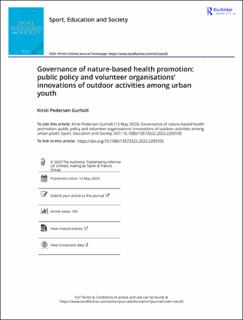Governance of nature-based health promotion: public policy and volunteer organisations’ innovations of outdoor activities among urban youth
Peer reviewed, Journal article
Published version
Permanent lenke
https://hdl.handle.net/11250/3103291Utgivelsesdato
2023Metadata
Vis full innførselSamlinger
Originalversjon
Pedersen Gurholt, K. Governance of nature-based health promotion: public policy and volunteer organisations’ innovations of outdoor activities among urban youth. Sport, Education and Society, 1-14. https://doi.org/10.1080/13573322.2023.2209105Sammendrag
This article explores multilevel governance networking and innovation to better understand how nature-based public health can be promoted at a grassroot level within an urban context. Hence, the leading research question examines the extent of networking and collaboration within state and municipal policymaking and the implementation of socially inclusive nature-based activities among urban youths conducted by local volunteer organisations. Multilevel networking and collaboration represent an analytical alternative to bottom-up and top-down strategies, which dominate the socio-political policies of outdoor studies in several countries. The exploration draws on empirical research conducted in 2020 based on a qualitative design. A website review was carried out to analyse facilitated nature-based health innovations embracing educational activities, leadership, and organisation run by local volunteer organisations targeting youth aged 6–19 across Oslo, Norway’s capital. The investigation was substantiated by twenty-eight interviews with leaders of volunteer organisations and primary healthcare coordinators in five of Oslo’s fifteen city districts, exploring their organisational experiences and reflections on nature-based innovations as a measure to promote health. The governance approach revealed several paradoxes and ambiguities in policy and practice. For example, there is a gap between the policy vision and available resources. There is also a need to understand better the complex networks and collaboration of public agencies and dedicated volunteers, their organisations, and interests. Furthermore, the continuous professionalisation of the voluntary sector and its significance in building a governance infrastructure that increases the capability of ongoing nature-based activity innovations need to be developed to meet policy goals and young people’s needs and interests. Social inequalities were reported among those participating in nature-based activities and those who were not engaged. This pattern follows the well-documented spatial distribution of socioeconomic disparities.

